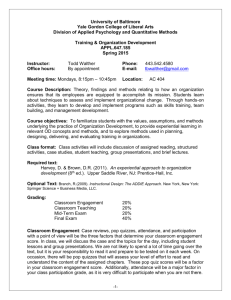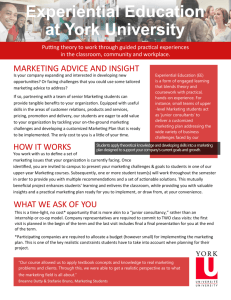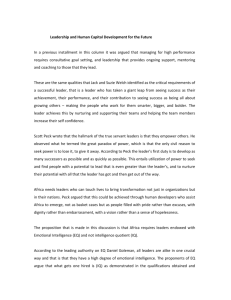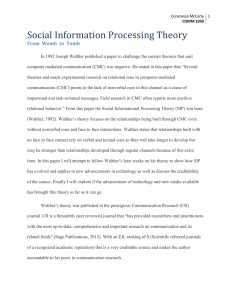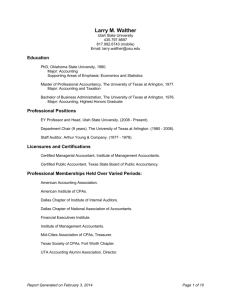sample syllabus
advertisement
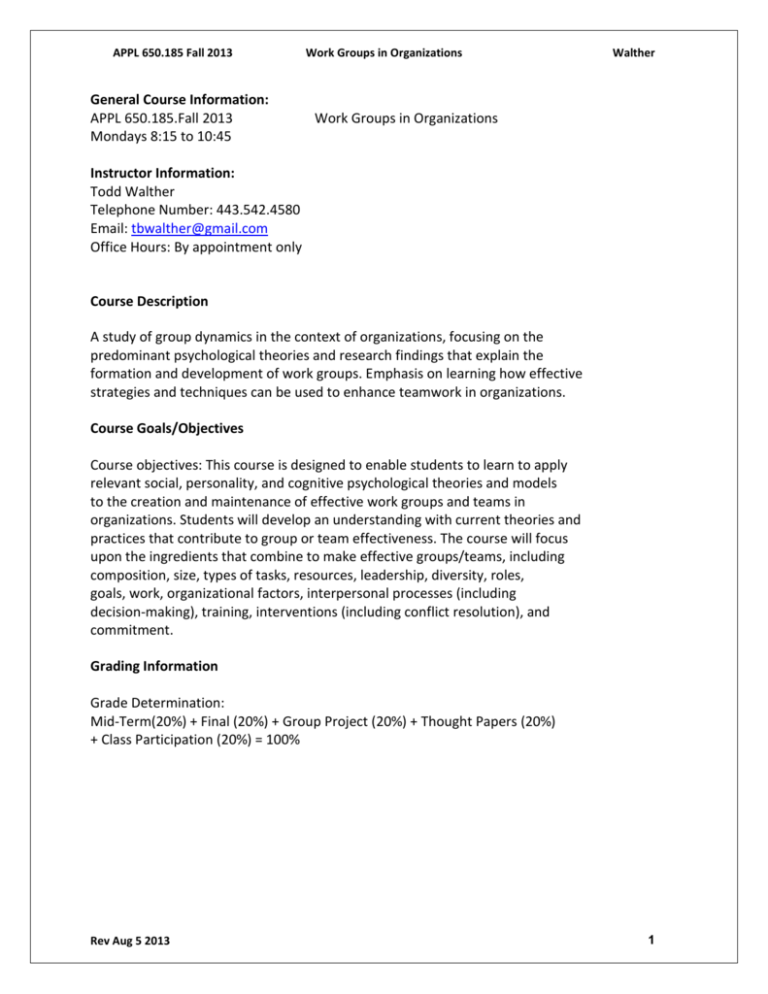
APPL 650.185 Fall 2013 General Course Information: APPL 650.185.Fall 2013 Mondays 8:15 to 10:45 Work Groups in Organizations Walther Work Groups in Organizations Instructor Information: Todd Walther Telephone Number: 443.542.4580 Email: tbwalther@gmail.com Office Hours: By appointment only Course Description A study of group dynamics in the context of organizations, focusing on the predominant psychological theories and research findings that explain the formation and development of work groups. Emphasis on learning how effective strategies and techniques can be used to enhance teamwork in organizations. Course Goals/Objectives Course objectives: This course is designed to enable students to learn to apply relevant social, personality, and cognitive psychological theories and models to the creation and maintenance of effective work groups and teams in organizations. Students will develop an understanding with current theories and practices that contribute to group or team effectiveness. The course will focus upon the ingredients that combine to make effective groups/teams, including composition, size, types of tasks, resources, leadership, diversity, roles, goals, work, organizational factors, interpersonal processes (including decision-making), training, interventions (including conflict resolution), and commitment. Grading Information Grade Determination: Mid-Term(20%) + Final (20%) + Group Project (20%) + Thought Papers (20%) + Class Participation (20%) = 100% Rev Aug 5 2013 1 APPL 650.185 Fall 2013 Work Groups in Organizations Walther Course Schedule Class Date Readings, Assignments, and Due Dates 9/9 Topic: Introduction to Work Groups in Organizations Relationship Building for Teams Description of course objectives, requirements. Experiential Exercise: Have You Ever? Homework Assignment Case Study: Wetlaufer, S. (1994). The team that wasn't. Harvard Business Review. November-December , p.4-7. 9/16 Topic: Defining Teams Discussion: The team that wasn’t. (Report out) Experiential Exercise: Understanding Aspects of Team Performance Assigned Reading: Cannon-Bowers, J.A., Tannenbaum, S.I., Salas, E., and Volpe, C.E. (1995). Defining competencies and establishing training team requirements. In P. Goodman (Ed.), Designing effective work groups (pp. 334-380). San Francisco: Jossey-Bass. 9/23 Topic: Appreciative Inquiry Experiential Exercise: Dream Teams Assigned reading: Bush, G. (1998) Appreciative Inquiry with Teams. The Organizational Development Journal, 16:3, pp. 41-50. 9/30 Topic: Team Processes and Outcomes Experiential Exercises: Blended Team Problem-solving Challenges – Warp Speed/ Hang Time Assigned Reading: Tuckman, B. (1965) Developmental Sequence in Small Groups. Psychological Bulletin, 63 pp. 384-399. 10/7 Topic: Groupthink Experiential Exercise: Survival Chapter 18. A First Look at Communication Theory, 3rd Edition. Ed. Griffin, (1997), McGraw-Hill. [Available: http://www.afirstlook.com/archive/groupthink.cfm?source=archther]. 10/14 Topic: Abilene Paradox Video: Abilene Paradox Assigned Reading: Deiss, K. (1999) Revisiting the Abilene Paradox: Is Management of Agreement Still an Issue? Leading Ideas, (8). Association of Research Libraries, Washington, DC. [Available: http://www.arl.org/diversity/leading/issue8/abilene.html] 10/21 *** Midterm Exam *** 10/28 Topic: Preparing for Team Building; Motivation Experiential Exercise: The Keypunch Assigned reading: Kerr, S. (1995). On the folly of rewarding A, while hoping for B. Academy of Management Executive, 9(1), 7-14. 11/4 Topic: Conflict in Teams Experiential Exercise: The Ugli Orange Rev Aug 5 2013 2 APPL 650.185 Fall 2013 11/11 11/18 11/25 12/2 12/9 12/16 Rev Aug 5 2013 Work Groups in Organizations Walther Assigned reading: Understanding the TKI – tbd Topic: Emotional Factors in Work Groups Experiential Exercise: Baron EQ-I Feedback Session Assignment: Complete the BarOn EQ-I on-line by April 23rd. Assigned reading: Goleman, D. (2000b). Leadership that gets results. Harvard Business Review, March-April, pp. 78-90. Bar-On, R.(2001). Emotional intelligence and self-actualization. In Joseph Ciarrochi, Joe Forgas, and John D. Mayer (Eds.), Emotional intelligence in everyday life: A scientific inquiry. New York: Psychology Press Mayer, J. D., Caruso, D., & Salovey, P. (1999). Emotional intelligence meets traditional standards for an intelligence. Intelligence, 27, pp.267-298. Recommended: Goleman, D. (1998b). What makes a leader? Harvard Business Review, November-December, pp. 92-102. Topic: Communication and Feedback Experiential Exercise: Colorblind Assigned reading: Argyris, C. (1991) Teaching smart people how to learn. Harvard Business Review, May-June, pp. 99-109. Ross, R. The Ladder of Inference. In The Fifth Discipline Fieldbook: Strategies and Tools for Building a Learning Organization (New York: Doubleday, 1994), pp. 242246. Ross, R. & Kleiner, A., The Left-Hand Column. In The Fifth Discipline Fieldbook: Strategies and Tools for Building a Learning Organization (New York: Doubleday, 1994), pp. 246-53. Ross, R. & Roberts, C. Balancing Advocacy and Inquiry. In The Fifth Discipline Fieldbook: Strategies and Tools for Building a Learning Organization (New York: Doubleday, 1994), 253-59 Group Projects Group Projects Group Projects Final Exam – Take Home: Due Midnight 3 APPL 650.185 Fall 2013 Work Groups in Organizations Walther Thought Papers Each week, you have an article or more to read in preparation for class. Please take time to summarize your thoughts about that article into a one page or less thought paper. What did you learn? What surprised you? What do you agree or disagree with? Please double-space and format the papers to a 12-point font. These thought papers account for a significant portion of your grade, so please take them seriously. Group Project Early in the semester you will form groups of 4-5 (no more, no less!) classmates to work with on the project. You should then identify an organization where you have access to employees and management. 1. Identify an issue or problem. Here, you can be creative, but the issue should be (a) relevant to topics we are learning about in work groups in organizations, and (b) relevant to members of the organization that you are studying. 2. Identify your conceptual framework. Pick a model as a basis to explore your research. 3. Collect “data”. What work group phenomenon are you seeing. How does it match or differ from what you expected to see based up research and course materials? 4. Write up an analysis, and make recommendations. Group Presentation 20% of Total Grade Group Presentation (50% of Project Grade): On that day, your group also will present its findings to the class in a 45-60 minute presentation. • Develop and present your presentation (PowerPoint optional) • Use lots of pictures and few words; ClipArt is unoriginal and outdated. • Make the presentation an experience; do not bore the audience, especially me. • Do NOT read slides • Find a large role in the presentation for everyone on your team. • Do not exceed 60 minutes on your presentation. Peer Evaluation (50% of Project Grade): Additionally, when the group project is turned in the group members also will submit a peer evaluation of the contribution of each group member to the product as a whole. The norm is to assign one group grade to each group member; however, I reserve the right to alter the allocation of grades based on strong evidence of freeriding in groups. As we will discuss in class, this policy is based on a significant body of research on social loafing in task groups. Rev Aug 5 2013 4 APPL 650.185 Fall 2013 Work Groups in Organizations Walther Course Materials Course materials are available through Langsdale Library's E-Reserves: A First Look at Communication Theory, 3rd Edition, Chapter 18.. Ed. Griffin, (1997), McGraw-Hill. [Available: http://www.afirstlook.com/archive/groupthink.cfm?source=archther]. Argyris, C. (1991) Teaching smart people how to learn. Harvard Business Review, May-June, pp. 99-109. Bar-On, R.(2001). Emotional intelligence and self-actualization. In Joseph Ciarrochi, Joe Forgas, and John D. Mayer (Eds.), Emotional intelligence in everyday life: A scientific inquiry. New York: Psychology Press. Bush, G. (1998) Appreciative Inquiry with Teams. The Organizational Development Journal, 16:3, pp. 41-50. Cannon-Bowers, J., Tannenbaum, S., Salas, E. & Volpe, C. (1995). Defining competencies and establishing team training requirements. In Guzzo, R., Salas, E. & Associates (1995). Team effectiveness and decision making in organizations. (pp. 333-79). San Francisco: Jossey-Bass Publishers. Deiss, K. (1999) Revisiting the Abilene Paradox: Is Management of Agreement Still an Issue? Leading Ideas, (8). Association of Research Libraries, Washington, DC. [Available: http://www.arl.org/diversity/leading/issue8/abilene.html] Dyer, W. (1995) Team Building: Current Issues and New Alternatives, 3rd ed. Addison Wesley Publishing Company. ISBN: 0-201-62882-1 Goleman, D. (2000b). Leadership that gets results. Harvard Business Review, March-April, pp. 78-90. Goleman, D. (1998b). What makes a leader? Harvard Business Review, November-December, pp. 92-102. Katzenbach, J.R. and Smith, D.K. (1993) The Discipline of Teams, Harvard Business Review, March-April, pp. 111-120. Kerr, S. (1995). On the folly of rewarding A, while hoping for B. Academy of Management Executive, 9(1), 7-14. Rev Aug 5 2013 5 APPL 650.185 Fall 2013 Work Groups in Organizations Walther Mayer, J. D., Caruso, D., & Salovey, P. (1999). Emotional intelligence meets traditional standards for an intelligence. Intelligence, 27, pp.267-298. Ross, R. The Ladder of Inference. In The Fifth Discipline Fieldbook: Strategies and Tools for Building a Learning Organization (New York: Doubleday, 1994), pp. 242-246. Ross, R. & Kleiner, A., The Left-Hand Column. In The Fifth Discipline Fieldbook: Strategies and Tools for Building a Learning Organization (New York: Doubleday, 1994), pp. 246-53. Ross, R. & Roberts, C. Balancing Advocacy and Inquiry. In The Fifth Discipline Fieldbook: Strategies and Tools for Building a Learning Organization (New York: Doubleday, 1994), 253-59. Stevens, M.J., & Campion, M. A. (1994). The knowledge, skill, and ability requirements for teamwork: Implications for human resource management. Journal of Management, 20, pp. 503-530. Stewart, G, Manz, C., & Sims, H. (1999). Teamwork and Group Dynamics, John Wiley and Sons, ISBN 0-471-19769-6 Tuckman, B. (1965) Developmental Sequence in Small Groups. Psychological Bulletin, 63 pp. 384-399. Wetlaufer, S. (1994). The team that wasn't. Harvard Business Review. November-December , p.4-7. Rev Aug 5 2013 6


